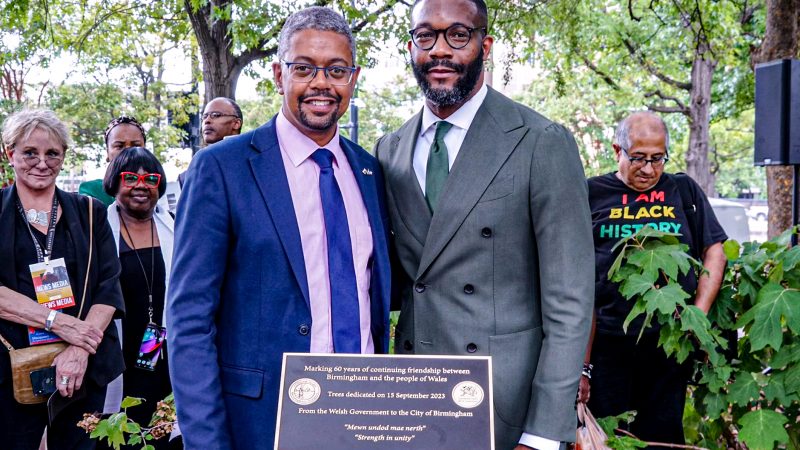
Last month, I had the immense honour of representing the Welsh government in Birmingham, Alabama, as the community marked the 60th anniversary of the bombing of the 16th Street Baptist Church that killed four girls and injured many more.
The racist killing of Addie Mae Collins, Cynthia Wesley, Carole Robertson and Denise McNair shocked the entire nation. The response to this act was pivotal to Black history in the United States, as it became the catalyst for the march to the Civil Rights Act 1964.
Upon hearing the news of the attack, John Petts, an artist living in Llansteffan in West Wales, was moved to do something. Working with the Western Mail, he began a fundraising drive so that he could create the Wales Window – a stained glass window depicting a Black Jesus, which now takes pride of place in the rebuilt church.
The fight for economic justice was central to the civil rights movement
The day-to-day of ministerial work offers little time for reflection, but the service provided that rare opportunity. To consider the progress and sacrifices made. The international links forged through adversity. And the journey still ahead of us.
The commemorations honoured heroic people – including the children of Birmingham – who contributed to the civil rights movement and their determination to turn the anguish of that bombing into progress.
That progress was existent in the speeches made by Black people serving in positions thought impossible at the time of the bombing – mayor Randall Woodfin, congresswoman Terri Sewell and Supreme Court Justice Ketanji Brown Jackson all representing that change in office.
And it was also clear how the fight for economic justice was at the heart of the wider movement. In the stark racial inequality of segregation-era America, it was a pervasive form of economic inequality that took away the dignity, respect and freedom that all of us should expect.
To those activists, the economic advancement of Black people was tied up in their civil and social progress – a crucial part in the march towards a good life. Now, just as then, the impact of economic inequality should focus our minds in the search for social justice.
Yesterday I had the honour of speaking at the 16th Street Baptist Church in Birmingham, Alabama.
To pay tribute to the four young lives taken 60 years ago.
And to reaffirm the solidarity from Wales that was shown all those years ago, with the donation of the Wales Window.
🏴🇺🇸 pic.twitter.com/9AM6f3FHu2— Vaughan Gething (@vaughangething) September 16, 2023
Social justice cannot be achieved without economic justice
In our Labour movement, we live by that same belief. It is why we should never get sucked into the culture wars ignited by our opponents, but instead should stay fixed on our determination to bring people together.
But even more so than then, we should look around us and be hopeful. As Dr King said: “There is nothing new about poverty. What is new, however, is that we have the resources to get rid of it.”
In Wales, our vision for the economy of the future is one where economic growth drives us towards equality and builds trust and connection between people. Where the end of economic inequality unlocks ability, widens opportunity and lifts children out of poverty.
To be in Alabama and reflect on the progress of Black Americans in 60 years was a reminder that our fight for social justice is fought on many fronts, but it is a fight that cannot be won without economic justice.
Our anti-racist action plan in Wales reflects just this. At the same time as we are ensuring our communities are represented in our street names, museums and classrooms, we are finding new ways to support Black entrepreneurs.
A fairer Wales depends on an economic future built by all of us
The other elements of my visit reflected this shared understanding which still binds the people of our nations together. Meeting with regional leaders and businesses in the South, we were able to promote Wales’s economic strengths and hear about local plans for inclusive growth.
After signing the International Friendship Pact between Wales and Birmingham, my next stop was a visit to the Innovation Depot, a business incubator for tech start-ups. The work, and even whole industries, may have changed over the decades – but the burning need to equip all young people with skills and opportunities remains.
British Black history is of course different in so many ways to Black history in the US, but that core challenge – no social justice without economic justice – remains. And it is something we should reflect on as we end Black History Month.
But it is of course not just true for Black people. It is true for all of us, and all of those who Harvey Milk called “The Us’s”. Because there is no equality unless everyone is equal. Our mission for a fairer Wales rests on an economic future built by all of us.




More from LabourList
‘Energy efficiency changes must work for older private renters’
‘Labour’s creative destruction dilemma’
Economic stability for an uncertain world: Spring Statement 2026